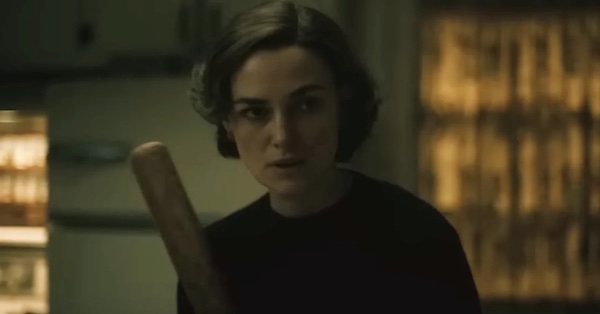Film Review: “Boston Strangler” — Pioneers of Journalism and Feminism
By Peg Aloi
Boston Strangler centers on women journalists who are devalued and must hold their own, demanding safety and justice in a society that doesn’t always deem them worthy of protection.
Boston Strangler directed by Matt Ruskin. Streaming on Hulu.

Keira Knightley protecting herself in Boston Strangler.
Most people past a certain age are familiar with the case of the Boston Strangler. Beginning in 1962, a killer targeted older women living alone, strangled them with their own stockings, and locked the door behind him when he left. Before the advent of DNA testing technology, solving homicide cases required very intensive police investigation. But in Boston, despite their efforts, the police were unable to crack the case. People were frightened and women were on high alert, locking their doors and warily eyeing strangers. Boston newspapers were on the case, but not energetically enough for one of their own, reporter Loretta McLaughlin, who worked for the Record-American.
Loretta (Keira Knightley, in a mature and measured performance) has been dutifully working under a female editor doing “lifestyle” coverage, but she has an interest in crime reporting. Loretta notices no papers are covering what look to be similarities in three murders, but her editor Jack MacLaine (an excellent Chris Cooper) gruffly refuses to allow her to work on the story. Instead, Loretta is assigned to write a review of a new toaster. The moment presages the protagonist’s uphill journey: her struggle to be taken seriously as a journalist and to raise awareness about violent crimes against women.
Offering to do the legwork on her own time, Loretta gets Jack to agree to let her tackle the story. Once published, her story about similar methods being used to murder the three female victims sparks an uproar, given that the other major Boston newspapers missed it. Loretta’s husband James (The Gilded Age’s Morgan Spector) is happy for her and supportive of her ambitions, even though working longer hours means he has to pitch in and take care of their three kids. The story was based on solid and verified facts, but the police commissioner (The Queen’s Gambit‘s Bill Camp) pays a visit to the newspaper and accuses Loretta of using her feminine wiles to manipulate beat cops for information. Needing support, Loretta notices another reporter, Jean Cole, working undercover on a high profile story about nursing home abuse. She admires her assertive approach and breezy dismissal of sexist jabs from male colleagues.
Soon enough, Jack assigns Loretta and Jean (Carrie Coon of The Nest and The Gilded Age) to work on the homicide story together. Loretta changes the killer’s moniker from the Boston Phantom to the Boston Strangler. After establishing a pattern of older victims, the killer begins to reverse direction and starts to target younger women. The police are no closer to apprehending the killer despite having leads on several suspects. Loretta befriends a detective (Amsterdam’s Alessandro Nivola) who eventually trusts her enough to hand over sensitive information. She and Jean continue to report on the murders. When Jack agrees to publish a story critical of the police and their seeming inaction, the cops try to sway public opinion against Loretta and Jean, both of whom begin to experience harassing and scary phone calls. Compounding her problems, James grows impatient with Loretta’s late nights and long hours away from home.
Boston Strangler slowly builds an exquisite atmosphere of tension and fear surrounding the killings themselves. Opening with a brief scene in 1965 in Ann Arbor, where a man hears a woman being attacked in the apartment next door, the 1962 killings in Boston are first dramatized mainly with sound, then shadowy images, and eventually full-on well-lit clarity. As the killer continues his violent spree and the city succumbs to a frenzy of fear and anger, the graphic spectacle of the killings underscores the urgency of Loretta and Jean to stop him, compounding their righteous frustration with the seemingly lax efforts of police to protect women from becoming victims. Both women grow increasingly adept at doing their own brand of detective work, and slowly begin to push past the barriers relegating them to the sidelines. As shocking evidence of a corrupt conspiracy emerges, Loretta and Jean are once again at the forefront of the coverage.
Written and directed by Matt Ruskin (Crown Heights), this period thriller and biopic portrays ’60s Boston with grim color palettes and scrupulous detail. Every attempt at a Boston accent is spot on, and the excellent cast embodies their characters’ speech and mannerisms (including copious smoking and clinking of numerous whiskey tumblers) with studied authenticity. As creepy suspects, David Dasmalchian and Ryan Winkles are aptly chilling. Seasoned character actors like Robert John Burke, Peter Gerety, and Rory Cochrane fill out the ranks of police. This film comes not long after Maria Shrader’s She Said, a film about two female journalists who face a fraught battle to expose the sexual crimes of Harvey Weinstein. In that film, women’s voices were centered and upheld. Boston Strangler focuses on women who are devalued and must hold their own, demanding safety and justice in a society that doesn’t always deem them worthy of protection. In this sense, Loretta McLaughlin and Jean Cole are portrayed as pioneers, both as journalists and as women demanding to be listened to.
Peg Aloi is a former film critic for the Boston Phoenix and member of the Boston Society of Film Critics, the Critics Choice Awards, and the Alliance for Women Film Journalists. She taught film studies in Boston for over a decade. She writes on film, TV, and culture for web publications like Time, Vice, Polygon, Bustle, Mic, Orlando Weekly, and Bloody Disgusting. Her blog “The Witching Hour” can be found on substack.
Tagged: Boston 1960s, Boston Strangler, Carrie Coon, Hulu, Keira Knightley, Matt Ruskin

